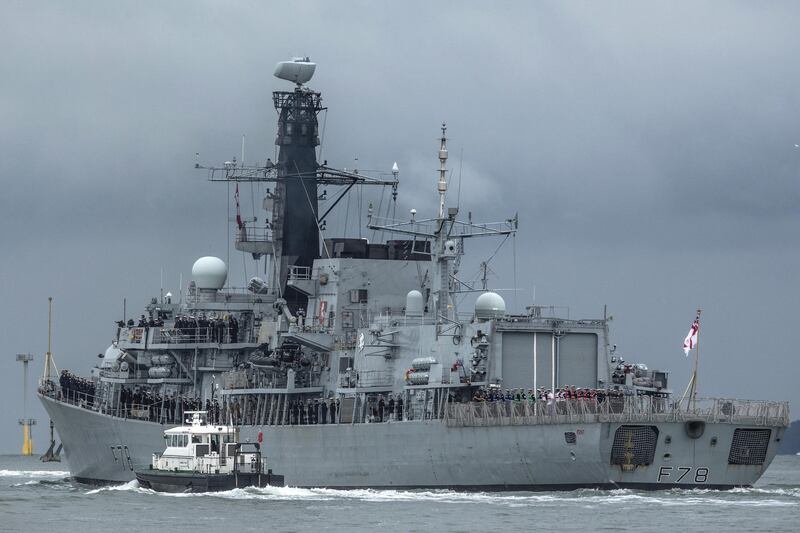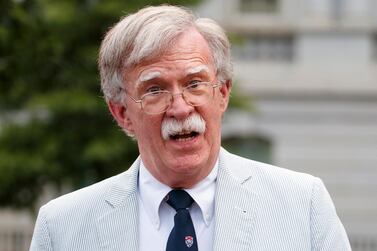A British warship has set sail to join a US-led task force to protect merchant shipping in the Gulf in response to threats posed by Iran.
It comes after US National Security Adviser John Bolton met British Prime Minister Boris Johnson to discuss Iran on Monday.
The Type-23 frigate HMS Kent left the UK on Monday to take over duties in the Strait of Hormuz from HMS Duncan.
The destroyer will work alongside HMS Montrose to escort British-flagged vessels through the Strait of Hormuz. So far, more than 50 vessels have been escorted.
Last week the UK announced it was joining the US-led naval mission to protect vessels travelling through the Strait of Hormuz.
It comes after Iran seized a British-flagged vessel, the Stena Impero, in the Strait of Hormuz four weeks ago for alleged marine violations.
The seizure came two weeks after British forces detained an Iranian oil tanker, the Grace 1, in Gibraltar over suspicions it was taking oil to Syria in breach of EU sanctions.
The new naval coalition was formed in response to increased tension in the Strait of Hormuz after attacks on oil tankers, which the US blamed on Iran.
"Our focus in the Gulf remains firmly one of de-escalating the current tension," HMS Kent's Commanding Officer Andy Brown said.
“But we are committed to upholding freedom of navigation and reassuring international shipping.”
When Mr Bolton, who has a hardline policy towards Iran, met Mr Johnson, he was thought to have put pressure on British officials to take a tougher stance on Tehran.
Mr Bolton highlighted the strong relationship between US President Donald Trump and Mr Johnson.
“Boris Johnson has been the Prime Minister for what, 18 days? They’ve already had five or six phone calls,” he said.
Mr Bolton said that former prime minister Theresa May had refused to join the US-led navy coalition in the Gulf, but Mr Johnson reversed the decision last week.
The UK is the only country to have joined the US coalition so far. Germany and France have baulked.
US maritime authorities have told American commercial ships to notify the British and US naval authorities in advance of their planned movements through Gulf waters.
The White House said on Monday that Mr Trump spoke with Mr Johnson to discuss issues including trade and global security.
The UK’s International Trade Secretary Liz Truss, Secretary for Exiting the EU Stephen Barclay and senior Cabinet member Michael Gove were expected to meet Mr Bolton on Tuesday.
This week Baghdad’s foreign minister, Mohamed Al Hakim, said that Iraq and the Gulf states do not need foreign powers to secure navigation as it would only increase regional tensions.
He also said that Israel’s participation in such a mission would be unacceptable.
However, it is not clear if Israel has been asked to join.
Mr Al Hakim’s tweet was in response to efforts by the Trump administration to set up a US-led naval security mission in the Strait of Hormuz.
Last week Iran’s President Hassan Rouhani said: “Peace with Iran is the mother of all peace, war with Iran is the mother of all wars.
“A strait for a strait. It can’t be that the Strait of Hormuz is free for you and the Strait of Gibraltar is not free for us.”
Tensions have risen between Iran and the West since last year when the US pulled out of an international agreement which curbed Iran’s nuclear programme in return for an easing of economic sanctions on Tehran.
Since May this year, ships have been the target of mysterious attacks, drones have been shot down and oil tankers seized in the strategic waters.
Approximately one fifth of the world’s oil traffic passes through the Strait of Hormuz.
In a further escalation on July 31, the US imposed sanctions on Iran’s foreign minister, Javad Zarif.
It led to Mr Rouhani saying the US must lift all sanctions if it wants to negotiate.
Last week Iran unveiled three precision-guided missiles. Its defence minister, Brig Gen Amir Hatami, said they show the country was ready to defend itself in the face of US “viciousness and conspiracies”.







